Caravan insurance Australia
Get peace of mind for your caravan, its annex and your precious valuables while you travel or keep your caravan parked up.
We’re reader-supported and may be paid when you visit links to partner sites. We don’t compare all products in the market, but we’re working on it!
Caravan Insurance Comparison
Compare up to 4 providers
- Caravan insurance 101
- Do I need insurance for a caravan?
- What does caravan insurance cover?
- Can I tailor my cover?
- How do the cover types compare?
- What additional options are there?
- What kinds of vehicles are covered?
- What exclusions should I be aware of?
- What should you look out for when choosing your policy?
- Find caravan insurance for your state
- What factors affect the cost of caravan insurance?
- How can I find cheap caravan insurance?
- Which is the best caravan insurance policy?
- Seniors Caravan Insurance
- Discounts for Seniors
- Questions you still might have
Caravan insurance 101
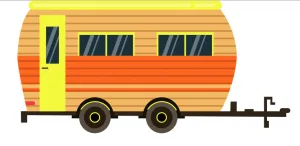
Caravans.
A caravan is an unpowered vehicle that is usually towed by your car. Whether you're adventuring across Australia or staying put in a caravan park, a caravan insurance policy should cover you.
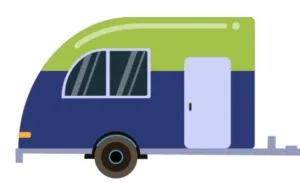
Camper trailers.
These are essentially hybrids of caravans and tents. They usually have a pop top, where the roof raises up to create a living space. If you're looking to get cover for a camper trailer, you're in the right place. You can get cover for your camper trailer under a standard caravan insurance policy.
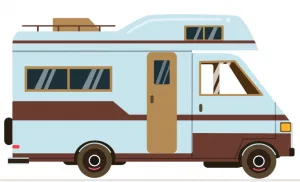
Motorhomes.
Motorhome have engines, making them fundamentally different than caravans. Caravan insurance policies don’t cover these vehicles. Instead you'd need motorhome insurance.
Do I need insurance for a caravan?
Whilst car insurance is a legal requirement, you’re not required to have insurance for a caravan. Your car’s CTP should cover any injuries that occur on the road, but only while it's attached to your car. However, if your trailer comes off and hits another car, you probably won't be covered. Having no insurance on your caravan is risky business and will mean that you’ll have to fork out your own cash if you’re in an accident.
What does caravan insurance cover?
Depending on your level of cover, caravan and trailer insurance can protect you if you hurt someone or something with your caravan or trailer. At the same time, it can protect you if your caravan or anything in it is damaged or stolen.
Here are a few situations where you may be covered:
- Your caravan smashes into someone’s car. If you’ve got comprehensive cover, your insurer should cover you for the cost of repairing or replacing the car.
- A thief makes off with your trailer. If someone steals your caravan or trailer, your insurance will cover you up to its full value.
- Local hoodlums trash your caravan. Insurance will cover vandalism, up to the full value of your caravan or trailer.
- Fire destroys your caravan. You're covered up to the full value of your caravan or trailer if it is damaged or destroyed by flood, fire, hail, explosion, lightning, impact and other natural events.
- You crash your trailer while towing it. Your policy will cover you if you damage or destroy your caravan in an accident, even if it was your fault.
- Someone steals your fishing gear from your trailer. Most policies will offer a small amount of contents cover for belongings inside the caravan. If the included amount is not enough to cover all your belongings, you can usually buy more contents cover.
- Your insurer is fixing or replacing your caravan. If your caravan or trailer needs to be fixed or replaced under an event listed in your policy, the policy will also pay to have it towed away and stored. It will also pay for you to stay somewhere else while you wait.
- Your caravan's air conditioning burns its motor. Your policy usually covers electrical appliances that form part of the caravan (ie, not something you bought separately). In some cases, it even covers these items when the motor burns out.
- Accidental damage. This benefit covers the cost of damages if your caravan or trailer is involved in an accident.
- Theft or attempted theft. If your van is stolen or damaged by attempted theft, caravan insurance provides financial protection for repair or replacement.
- Malicious damage and vandalism. You’ll be covered for loss or damage caused to your caravan as a result of vandalism.
- Fire. If your caravan is damaged or destroyed by fire, caravan insurance can cover the cost of its repair or replacement.
- Storm. Loss or damage caused by storms is also included in cover.
- Flood. Some caravan insurance policies will provide cover for loss or damage to your caravan as a result of flood.
- Legal liability cover. If an incident occurs that leads to death, injury, loss or damage to another person, your caravan insurance policy will cover your legal liability, including the costs incurred in your legal defence.
- Contents cover. Caravan insurance policies also typically include a certain level of cover for your contents. This includes food spoilage cover following an insured event as well as cover for loss or damage to carpets, household goods, CDs and DVDs, clothes, entertainment systems, televisions, personal belongings, furniture, furnishings, jewellery, tools and more.
- Temporary accommodation. Your temporary accommodation costs will be covered if your static caravan cannot be lived in following an insured event. Similar cover will apply if an insured event occurs to your touring caravan or trailer when you’re more than a specified distance from home.
- Storage costs. You’ll be covered for storage costs following an insured incident.
- Legal representation. This benefit provides cover for the cost of your legal representation if you need to be represented before a coroner conducting an inquiry or if you need to be represented before a magistrate.
- Towing. This benefit provides cover if your touring caravan or trailer needs to be towed from the site of an incident to a repairer or a place of safety.
- Emergency repairs. If an insurer agrees to cover your claim and you’ve already made emergency repairs to your caravan or trailer, the insurer may cover the cost of those emergency repairs.
- Optional additional contents cover. Some insurance providers offer the option of taking out a higher level of cover for your caravan contents or increasing the insured limit for specified valuable items. You’ll need to pay an extra premium to take advantage of this option.
- Optional annexe cover. You can extend your caravan insurance policy to provide cover for your annexe in the event of a range of insured incidents such as fire, storm, theft and malicious damage. However, if your annexe is made of canvas, vinyl or fabric, the insurer will need to be certain that it was in good condition before the incident.
- Optional cover break. Some insurers will allow you to take a break from cover for a limited period if you know you won’t be using your touring caravan during that time. This allows you to save money on premiums.
Can I tailor my cover?
You’ll be covered for some or all of the above scenarios depending on the level of cover you go with. Here are the different levels that are available:
- Third-party property only. This only covers you if you injure someone or damage their property. Damage to your own caravan isn’t covered at all.
- Third-party fire and theft. This adds to the above policy by covering your vehicle for theft, fire and earthquake. It doesn't cover you for other natural events, accidents or vandalism.
- Comprehensive. This offers all of the protections of the other two levels, plus it protects you from most other types of damages. The damage can be accidental or intentional, or it can come from a number of natural events, including storms, floods, hail, fire and earthquake.
If you’re only after CTP coverage, then your caravan will usually be covered as part of your cars CTP policy or included in your registration, depending on what state you live in.
How do the cover types compare?
| Feature | Comprehensive | Fire & Theft | Third Party Property |
|---|---|---|---|
| Accidental damage |
|
|
|
| Intentional damage |
|
|
|
| Storm or flood |
|
|
|
| Fire |
|
|
|
| Theft |
|
|
|
| Earthquake |
|
|
|
| Emergency transport, accommodation and repairs |
|
|
|
| Towing costs |
|
|
|
| Contents |
|
|
|
| Caravan park fees |
|
|
|
| Locks and keys |
|
|
|
| Solar panels/TV antennas |
|
|
|
| Legal liability |
|
|
|
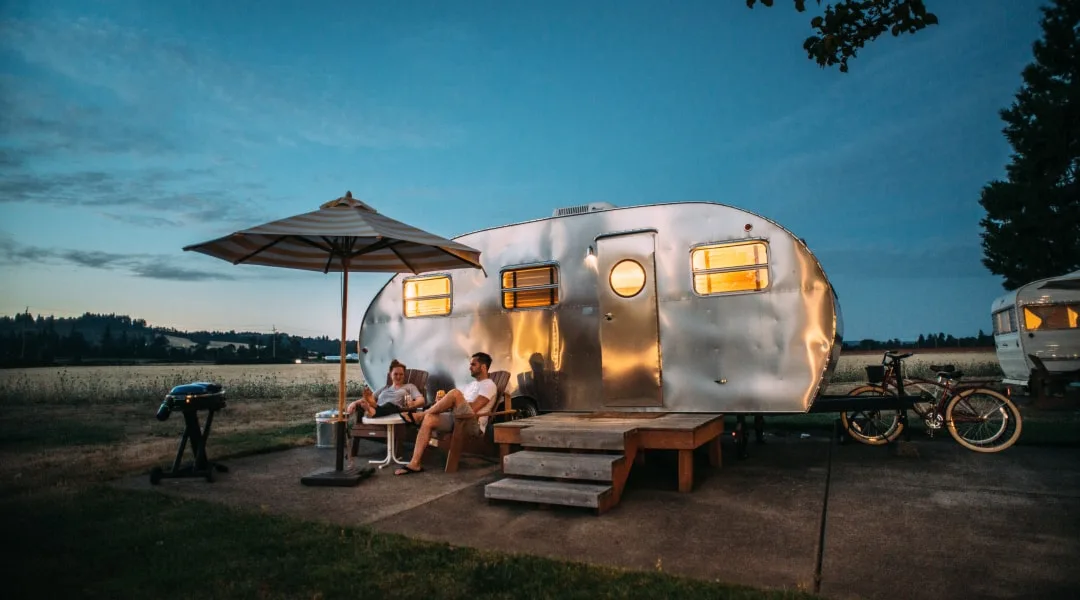
What additional options are there?
In addition to the benefits that automatically come with your policy, you can choose to add a few more. Here are the most common options available:
- Contents cover. Most policies include a token amount of cover for your personal belongings (maybe up to $1,000), but that’s probably not enough if your computers, bikes and fishing gear all get stolen. Extra contents cover will take care of all of that.
- Annex cover. An annex is a tent-like structure that you can pop up next to your caravan for that real camping feel. It’s not automatically covered, but you can add an annex option that will protect it against natural events, theft and vandalism. Your insurer might want to inspect it first to make sure it is in good condition.
- Lay-up cover. This is ideal if you store your caravan for long periods of time and want to pay reduced premiums during those periods. It’s essentially like having two policies in one: one for the usage period and a cheaper one for the storage period. You’ll pay the insurer a little extra up front to work out the two sets of details, but it can save you on premiums in the long run.
What kinds of vehicles are covered?
Caravan and trailer insurance is available for basically any caravan, cabin or trailer popular with the caravanning community – as long as it doesn’t have an engine (we’re looking at you, motorhomes).
Here are all the vehicles (and one non-vehicle) you can get covered under a caravan insurance policy:
Touring caravans. These are vehicles equipped to live in and that you can tow from place to place with a car. They are large, solidly-built structures with all the comforts of home, like a kitchen, beds, enclosed bathroom and heating/air conditioning.
Camper trailers. A camper trailer is a type of touring caravan that folds down into a compact trailer for towing. When camped, it opens into a small tent-like living space with a simple toilet instead of a bathroom and an outdoor BBQ instead of a kitchen.
On-site caravans. These are really just small cabins that sit permanently in one spot. These are sometimes called static caravans since they aren't technically mobile, but the caravanning community and insurers still consider them as vehicles.
Trailers and horse floats. These are vehicles you tow behind you to transport cargo. These aren’t technically caravans either, but because they share so many similarities, you can insure them under a caravan insurance policy.
What exclusions should I be aware of?
There are a number of reasons why your insurer may reject your claim for accidents, thefts and damages. Here are the most common reasons insurers will reject your claim:
- You didn't secure your caravan or trailer well enough. You can't just let bad things happen to your caravan and expect a payout. For example, camper trailers are very difficult to break into when collapsed but not when opened up into a living space. If you leave your open camper trailer unattended, you probably won’t be covered if something is stolen.
- You were reckless with the caravan or used it for unapproved activities. Don’t do anything stupid. If you are letting off fireworks right next to the caravan while drunk, you'll probably be denied if you have to make a claim for damages.
- You didn't maintain your caravan well enough. Your insurer might reject your claim if they think the damage or loss was a result of poor upkeep. This can include anything from rust to mould to critter infestation.
- You used the caravan when you were supposed to store it. If you have lay-up cover and you use the caravan while it is supposed to be stored, the insurer can deny your claim.
- Due to wear and tear. You can’t expect a payout because your caravan is old and well-used. It has to be because of a sudden and legitimate accident.
- Your tyre or windshield was damaged or punctured on the road. These “random” occurrences aren’t typically covered unless stated otherwise.
- Your caravan or trailer malfunctioned. Your insurer won't pay for faulty workmanship on your caravan or trailer. They also won’t pay for anything that’s covered under a manufacturer’s warranty.
- It’s a result of certain weather events. You’re covered for many weather events, but a lot of policies exclude erosion, actions of the sea and extreme temperature.
- It is for loss or damage that occurs outside Australia
- It is for loss or damage to your caravan or trailer while on consignment
- It is for repairs to old damage
- It is for loss of value of your caravan or trailer
- It is for the cost of fixing previous faulty repairs
- It is for tyre damage caused by road cuts, punctures, breaking or bursting
- It is for loss or damage to glass, ceramic or a sanitary item where there is a fracture that doesn’t extend all the way through the item
- It is for loss or damage covered under any manufacturer’s warranty
- It arises due to rust, corrosion, gradual deterioration or wear and tear
- It is a result of erosion
- It is caused by actions of the sea (except a storm surge that happens at the same time as a storm or flood, high tides or king tides, sea waves or normal movement or changes in ocean levels)
- It is caused by subsidence or landslide, unless it happens as a result of earthquake, explosion, storm or flood
- It is caused by mould, atmospheric conditions or extreme temperature
- It is a result of faulty design or workmanship
- It is caused by fusion of electric motors
- It is a result of the repair or replacement of any item that explodes
- It is a result of the repair or replacement of any item from which liquid leaks or escapes
- It is caused by the lawful seizure or confiscation of your caravan or trailer
- It is for loss or damage caused by mechanical, structural or electrical failure
- It is caused by tree lopping or felling
- You failed to secure your caravan or trailer in a safe position after it broke down, suffered accidental damage, or was stolen and then found
- It is caused by vermin, rodents, insects or birds
- It arises because your caravan or trailer was being used for any unlawful purpose
What should you look out for when choosing your policy?
While most policies will include similar protections to each other, you may find that some offer little perks that help it stand out above the rest. When choosing a policy, find out how they handle the following:
- Choice of repairer. If your caravan needs repair, you might feel more comfortable if it's repaired by someone whose workmanship you trust. If that matters to you, choose a policy that allows you to choose your own repairer.
- Windshield. You'd think a broken windshield would automatically be covered as "damage". As with many car insurance policies, insurers sometimes exclude windshield from cover. See if you can find a policy that includes this automatically.
- Individual limits on contents. Regardless of how much contents cover you have, you might find that you can only claim a certain amount per item. For example, you might have $10,000 total contents cover, but can't claim more than $1,000 per piece of jewelry. If ten pieces of $1,000 jewelry were stolen, you'd be fine. If one $10,000 item was stolen, you'd be out of luck. Check your individual limits, and if you want to insure a specific item for more than that, look into high-value contents insurance.
Find caravan insurance for your state
Use the map below to compare caravan insurance based on your location.
What to consider if you're on the go or staying put
Owning a touring caravan brings a different set of opportunities and challenges than owning a static caravan, and these will have an impact on your insurance. Here are some factors you should consider depending on what style of caravan you own.
Mobile caravan insurance
These vehicles spend a lot of time in one of three places: on the road being passively towed, in camp where they serve as your home and in storage where they sit idle.
That’s three different sets of circumstances with different sets of risks, and your policy will need to cover all of them. Here is what touring caravan owners need to look out for:
- Is your caravan secure enough? Your claim can be denied if your caravan isn’t secure. Unfortunately, according to insurers a camper trailer isn’t secure when it is open, because the walls are mesh like a tent. That means you won’t be covered if you leave it open and unattended. You’ll have to close it up and lock it if you plan on leaving it alone. The same goes for a caravan – if you’re heading off for a walk, make sure you lock everything up.
- Will you be storing your caravan? Since you're probably only going to be on the road for a few months each year, make sure you also take out lay-up cover. This will protect your caravan while it's in storage at a lower rate than it costs to insure when it’s in use.
- Is there enough liability cover? If you are on the road often, your risk of injuring someone or damaging something increases. Your car’s CTP insurance will cover you if your caravan is in roadworthy condition, but you’ll still want to make sure you have enough cover in case someone sues you.
- Have you considered roadside assistance? Being on the road a lot means more opportunity to break down. Roadside assistance will tow your car and your caravan as long as you have the right plan. Make sure your plan offers to tow caravans and trailers and that it will tow them far enough for you.
Onsite caravan insurance
Unlike a touring caravan, and on-site caravan will be spending all its time in one place. Here are some factors on-site caravan owners should consider when taking out insurance:
- Do you have enough contents insurance? If you've got a caravan that isn't moving then chances are that it's your home! If that's the case, make sure you've got a high contents insurance policy as you'll probably have more possessions in your caravan than the average person.
- Will you be renting it out to someone else? If you are renting out your on-site caravan as a holiday home, your standard caravan insurance policy won’t cover you, and you’ll have to take out a landlord policy. Your best bet is to contact a speciality caravan insurer.
- Will you be moving it? Even though it is “permanent”, with a little bit of effort you can still relocate an on-site trailer to a different site. If you do so, make sure to let your insurer know the new location or your policy could be voided.
Cost
What factors affect the cost of caravan insurance?
The cost of caravan insurance varies from person to person and caravan to caravan. Here are the factors that determine your policy's cost:
- How much you insure on the caravan. You can insure the caravan for virtually any amount you want up to its value. The higher you insure it for, the higher the premiums will be.
- How you’re going to use it. If you're hitting the road regularly your premiums will be different than someone who keeps their caravan parked in the same spot all year round.
- Your level of cover. A policy covering third-party property only will cost you less than a comprehensive policy. Additional cover like the annex add-on can increase your premiums.
- Your agreed out-of-pocket expenses. Your excess is the amount of money you agree to pay out of pocket any time you claim. You can often choose your own excess amount when getting your policy. A higher excess means lower premiums because you'll be taking up more of the slack when it's time to claim.
How can I find cheap caravan insurance?
Here are a few ways to save on your policy:
- Keep a clean driving record. A good driver equals less risk to the insurer, so let your insurer know about your driving record, and they may offer you a discount on your policy.
- Store your caravan when you're not using it. You can usually save on your policy if you agree not to use it during certain times of the year. To get a reduced premium for the off-season, look into the "lay-up" option described earlier in this article.
- Consider staying put for a while. Caravaners who are constantly towing their caravan from one campsite to the next will have higher premiums than someone who stays put. That's because driving on the road is riskier.
- Choose a higher excess. You can save on premiums by agreeing to pay more out of pocket when it's time to claim. The more you pay toward a claim, the less the insurer has to.
- Secure your caravan. A secure caravan means lower risk for you and the insurer. You may be able to save on your premium by installing cameras, sensor lighting and alarms or other security devices.
- If you have any other policies with the insurer. You might be able to get a discount if you have more than one policy with the insurer. Car insurance would be a natural fit, so you may want to ask the insurer what deals you can get by taking out both policies.
Which is the best caravan insurance policy?
There is no one "best" insurer or policy. The best policy for you means a policy from a reputable provider that covers you for what you need for a great price.
Your best bet is to think about what you need and then to compare policies that meet those needs.
If you’re stuck, here are some companies that offer caravan insurance:
Seniors Caravan Insurance
Getting caravan insurance if you're over 50 is simple and relatively easy to find. Caravanning is popular in Australia among seniors and there are several insurance agencies that operate specifically for over 50s. This is because there is a smaller chance of seniors making a claim.
Many insurers cover seniors over 50 but insurance becomes trickier to find as you go over 70. However, some insurers are set up specifically to provide cover for seniors. These include:
- National seniors insurance
- COTA Insurance
- Over50insurance
Discounts for Seniors
As a result, caravan insurance for seniors regularly comes with some added benefits and discounts. These can include:
- No claims bonus discounts. If you haven't been involved in an accident or had to make any claims over a certain period of time - usually 5 years - you're safe driving is often rewarded with a discount.
- Rewards for loyalty. To prevent you from moving to a different insurer, many providers offer lower premiums for over 50s that stay with them.
- More contents cover. In addition to this, seniors are often able to get the option of increasing their caravan contents cover for valuable things like furniture, crockery and personal items.
The following services are usually also included:
- Cover for accidental loss or damage
- Legal liability
- Emergency accommodation
- Emergency repairs
- Flexible payment options
Questions you still might have
Does caravan insurance cover your car?
No. Caravan insurance covers your caravan or trailer only, not your car. If you drive a car, you will need mandatory CTP insurance at a minimum regardless of whether or not you have insurance for your caravan.
What if you're just renting a caravan?
If you are renting a caravan, you will need to get insurance from the company through which you are renting. The policies discussed in this guide are meant for owners only.
What if you only use your caravan a few times a year?
It is very common to use your caravan seasonally only. Your best bet is to get a policy with the "lay-up" option. This is a two-pronged policy that covers you for one set of conditions when you are using it and one set of conditions for when you aren't . For example, you'll pay less when you are storing it because it's not on the road or being used as much.
Do caravans need to be insured?
No. You're not required to have caravan insurance even if you are towing it behind a car, but we don't recommend passing on caravan insurance. A caravan is an expensive item (as are many of your contents within it) and you wouldn’t want to replace it out of pocket if it were to be damaged or destroyed.
Picture: GettyImages
Alexandra Koster is Finder's publisher for car, home and pet insurance. She has a Tier 1 certification in General Insurance, as well as a Bachelor of Arts in Film and Cultural Studies from the University of Sydney. Her hobbies include reading Product Disclosure Statements and deciphering complicated insurance lingo to help people save on their insurance so that they can spend their money on better things – like dogs.
More guides on Finder
- Caravan Insurance Western Australia
Your guide to finding caravan insurance in WA.
- Caravan Insurance Victoria
Need to find the best caravan insurance for you? Living in Victoria? Learn what to look for and how to get covered with this breakdown on caravan insurance.
- Caravan insurance QLD
Your guide to Queensland caravan insurance,
- Trailer Insurance
Guide to getting trailer insurance for caravans, mobile homes and box trailers.
- Camper Trailer Insurance
Compare camper trailer insurance policies from Australian brands and get covered securely.
- Motorhome insurance Australia
Need motorhome or campervan insurance, then read on here to find out what you need to know.
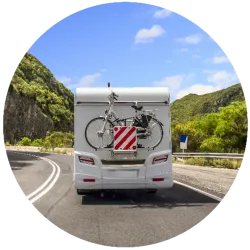
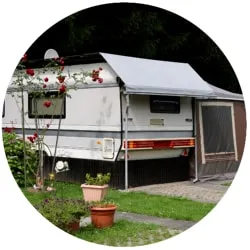
If I want to live full time in my caravan and travel from state to state does anyone cover this scenario?
Hi Alan,
Thanks for your question.
Most insurance companies will cover you nationwide – but you will still need to provide a ‘home’ address. In order to get covered whilst travelling, make sure you select the travelling caravan option. We’ve got more information on caravan insurance and how it works here: https://www.finder.com.au/car-insurance/caravan-insurance.
I hope this helps!
Kind Regards,
Mai
We currently have caravan insurance however we are in the process of joining a company to rent the van out when we are not using it. How do we insurance insurance for both hiring and personal use
Hi Darryn,
Thank you for getting in touch with Finder.
Since you currently have caravan insurance, please contact your insurers directly about having your vehicle “for rent” and help you get covered. Most regular caravan insurance policies won’t cover you for an accident if you were taking fares at the time. That’s why you need a policy that covers ridesharing.
I hope this helps.
Thank you and have a wonderful day!
Cheers,
Jeni
I was wondering how much is it to insure my camper trailer and if you get discount if you are a senior, we have our campervan stored in the yard most of the time secured by locked gate it is a 2017 model Jayco swan would appreciate a quote. Thanks!
Hi Cheryl,
Thanks for getting in touch! The cost of caravan insurance varies from person to person and caravan to caravan and the criteria are found on the part of the page that says: How much does caravan insurance cost? Senior discounts are also dependent on the provider you choose. You can find a list of providers above that you can call up to see how much they can insure your caravan. Be sure to check the eligibility requirements when applying for one to get higher chances of approval! :)
Hope this helps!
Best,
Nikki
What caravan insurance companies offer lay up policies for the time you are not traveling with the caravan?
Hi Gordon,
Thanks for getting in touch with finder. I hope all is well with you. :)
Typically, most insurers provide static caravan cover. You might want to give the insurer listed above on this page a try by clicking on the Get Quote button. This should redirect you to their website and from there, you can then discuss your needs and preference.
I hope this helps. Should you have further questions, please don’t hesitate to reach us out again.
Have a wonderful day!
Cheers,
Joshua
We have a 2005 space land caravan 22 ft how do we compare insurances
Lynne
Hi Lynne,
Thank you for reaching out to finder.
Though we currently do not have a way to compare each insurer and provide a price for caravan coverage, you may need to directly contact the insurer to ask for this. Caravan coverage depends on a number of factors like the size, year and model, weight and other factors that are required to give a specific quote. Hope this helps!
Cheers,
Reggie